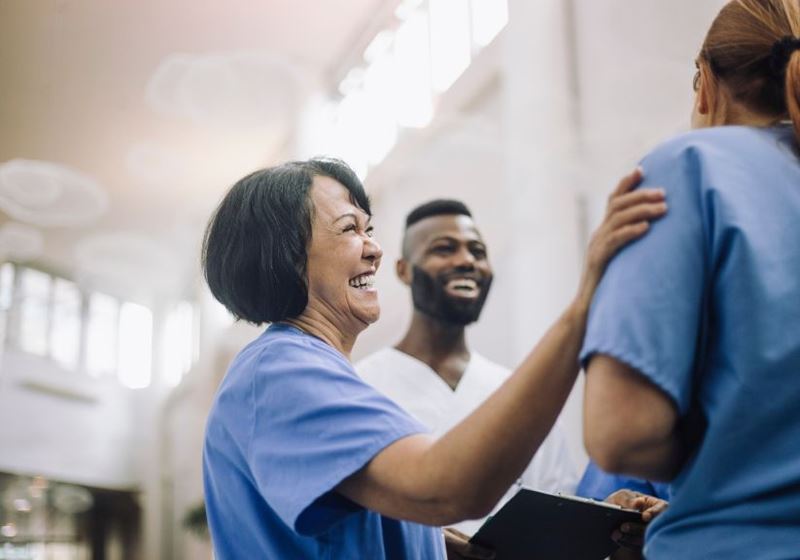Why working longer keeps you happier
Retirement isn’t always the happy ending we imagine. Staying in work could be best for your health, happiness and sense of purpose.

Retirement isn’t always the happy ending we imagine. Staying in work could be best for your health, happiness and sense of purpose.

You've put in the years, watched colleagues sail off into retirement, perhaps even counted down the days yourself, so why does the idea of stopping work suddenly feel less appealing than you'd imagined?
You're not alone in feeling this way. More of us are choosing to stay in the workplace for longer. While financial necessity plays a part for some, there's growing evidence that remaining active in our careers could be one of the keys to a healthier, more fulfilling later life.
Research consistently shows that the timing and circumstances of retirement matter significantly. The 2020 Lancet Commission on dementia prevention found that in people retiring around age 61, verbal memory declined 38% faster after retirement compared to before.
Meanwhile, other studies have shown that loneliness and social isolation, which can both increase after leaving work, are strongly linked to depression and cognitive decline in older adults.
The circumstances of retirement matter too. One study of British civil servants found that voluntary retirement at statutory age improved mental and physical wellbeing, while those forced to retire due to illness or job loss often saw their health worsen.
“If you enjoy your work and it supports your physical and mental wellbeing, continuing is beneficial,” says Ana Carolina Goncalves, pharmacist at Pharmica. “Evidence suggests that meaningful, manageable work helps preserve cognitive function, emotional stability and physical activity levels.”
Work provides more than a payslip. It offers identity, purpose, structure and social connection, all of which can become fragile when retirement arrives.
“People assume retirement equals happiness, they think it’s going to be a vacation,” says retirement coach George Jerjian, author of An Odyssey of an Elder. “But this concept of happiness in retirement in the traditional sense is completely delusional. What we do and our identity are integrated. Once work is taken away, the scaffolding breaks.”
He points to the concept of “identity bridging”, where people describe themselves as “a retired doctor” or “former lawyer” – clinging to titles that once defined them.
“It’s scary,” he says. “But retirement is a chance to shed your old skin and become something new.”
Without the rhythm of work, days can blur. That can feel liberating at first but quickly becomes disorienting.
“If you’re retired and doing nothing, you now have all the time in the world to create new worries that don’t really exist,” says Jerjian.
A 2018 study found that older adults with a regular daily routine reported better health and made fewer urgent healthcare visits, than those with unstructured days.
More recently, a 2024 study in The Journals of Gerontology found that older people who socialised at the same time each day experienced greater emotional wellbeing than those with less predictable patterns.

Work is often where we feel seen, useful and connected and that doesn’t suddenly stop mattering at 65.
“Roles that offer autonomy, social interaction and cognitive engagement (for example, education, healthcare, or creative professions) are associated with better overall health and slower cognitive ageing,” says Goncalves.
And it’s not just a nice feeling, science backs it up. Research points to the protective effect of staying socially and occupationally active in older age: higher levels of social engagement are associated with lower risk of cognitive decline and depression.
Jerjian adds that for many retirees, particularly men, losing workplace relationships can lead to withdrawal.
“You start to retreat because you don’t want to answer questions about what you do now,” he says. “That isolation leads to loneliness, which can spiral.”
Psychologist Erik Erikson called it “generativity” – that later-life urge to give back and feel useful. And for many, work offers a tangible way to meet that need. Whether it’s mentoring younger colleagues, solving problems, or simply showing up and doing something that matters, feeling useful still counts, no matter your age.
A cross-national study across 16 European countries found that retirees who continued working reported higher life satisfaction. The researchers concluded that staying active through meaningful work can play a crucial role in maintaining wellbeing in later life.
It’s easy to overlook, but even desk-based work keeps you moving more than you might think. The commute, walking to meetings, popping to the printer, it all adds up. And that gentle, consistent activity helps maintain muscle strength, balance and mobility as we age.
“Light to moderate physical activity associated with certain jobs – such as standing, walking, or lifting – can preserve muscle mass and balance, reducing the risk of becoming frail or physically weak later in life,” says Goncalves.
The key is finding work that keeps you gently active without pushing you beyond what feels sustainable. If your current role feels physically demanding in the wrong ways, it might be worth exploring flexible hours, reduced workloads, or different types of work that still keep you engaged, just at a pace that works for you.
Let’s address the elephant in the room: money. And for many of us, it matters more than we’d initially planned for.
“Unless you're in the top 1%, you’re highly unlikely to be able to even squeeze through a 25-year retirement,” says Jerjian bluntly. “The odds are that you will outlive your savings. And that’s the biggest nightmare because you will outlive your savings at the worst possible time.”
It’s an uncomfortable truth but ignoring it doesn’t help. The good news? Continuing to work, even part-time, can ease that financial pressure significantly. It’s not just about the income itself, though that certainly helps. It’s about maintaining access to workplace benefits, building up pension contributions for longer, as well as creating a buffer against rising costs and unexpected expenses.
And the impact goes beyond your bank balance. Financial strain takes a real toll on our health.
One large study reviewed 40 papers and found a consistent link between financial stress, including debt and money worries, and depression in adults of all ages.
And among older adults, the effect can be even more acute: a recent study found that those facing persistent financial strain were nearly twice as likely to experience depressive symptoms compared to those without such stress.
Working longer isn’t always the right answer.
“Work becomes detrimental when physical or psychological demands exceed a person's capacity to cope,” Goncalves warns. “Heavy manual labour, shift work or chronically stressful roles can worsen musculoskeletal pain, cardiovascular strain and sleep disruption in older workers.”
And Jerjian warns against staying in work purely out of fear.
“You’re just delaying the inevitable – that need to reinvent yourself. And the later you leave it, the harder it becomes.”
Jerjian knows about false starts. At 52, a terminal diagnosis thrust him into semi-retirement, which turned out to be “hellish”, even after his health was restored.
“I had money, friends, good health and an active social life, but it wasn’t enough,” he says.
So he “unretired” and embarked on a journey to discover his true purpose, eventually becoming a retirement coach and author helping others navigate the same transition. His advice? See this chapter as a creative opportunity. “It’s life knocking on your door, asking who you want to be next,” he says.
Phased hours, part-time roles, mentoring or launching a side project – there are countless ways to stay engaged without burning out.
Whether you’re 58 and dreaming of allotments or 72 and launching a new business, there's no single right way forward. But the happiest transitions share one thing: purpose.
“This isn’t the end,” says Jerjian. “It’s a blank page and you get to write it.”
And the research agrees: it’s not your age that matters most, it’s what you do with your time.
(Hero image credit: Getty Images)
The experts at Saga Money have more advice on how to manage your career, tax and pension after the age of 67 – including new career paths, flexible working and starting a business.
Jayne cut her online journalism teeth 24 years ago in an era when a dialling tone and slow page load were standard. During this time, she’s written about a variety of subjects and is just at home road-testing TVs as she is interviewing TV stars.
A diverse career has seen Jayne launch websites for popular magazines, collaborate with top brands, write regularly for major publications including Woman&Home, Yahoo! and The Daily Telegraph, create a podcast, and also write a tech column for Women’s Own.


Let’s make sure you have the right plans in place for you and your loved ones.

Get 3 months free, plus a £125 Totally Rewards Wellness Gift Card when you start a new policy by the end of 19 February 2026. T&Cs apply.
Underwritten by Bupa Insurance Limited.

We examine the science and how to best look after our brain as we get older.

Want to start winter mornings feeling energised? Follow these five simple tips.

Expert nutritionists break down the most important foods to eat in each decade as we get older.

Your neighbourhood pharmacist now offers a surprising number of services.



10 simple alternative items that can have a big effect on your health – without depriving you.


New measures for GP appointments are in the headlines, but what effect will they have for you when it comes to getting to see a doctor?

Everything you need to know about the lung infection, and how you could be ill with “walking” pneumonia without realising it.